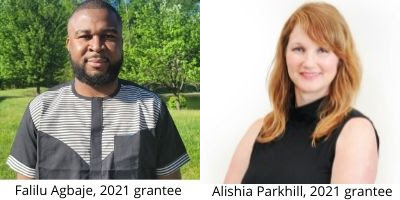The University of Maryland, Baltimore (UMB) awarded two students $2,500 this week from its pilot UMB Student Social Venture Fund.
Along with being a boost for the ventures, it’s a new approach for funding them: UMB is trying to set a national standard for structured financial support to promising social entrepreneurs that have decided that the nonprofit model isn’t a sustainable way to support their mission.
The two students receiving seed stage grants from the University of Maryland Graduate School’s Master of Science in Health and Social Innovation Program are:
- Alishia Parkhill, founder of Upholdu, which provides patient advocacy, health coaching and end-of-life doula services for women and femmes diagnosed with serious chronic illnesses.
- Falilu “O.P.” Agbaje, founder of Aolat Treatment Place, a psychiatric rehabilitation program and outpatient mental health center in Baltimore that serves individuals as young as six.
Maryland entrepreneurs contributed to the new fund. A donation from Mei Xu, who founded Yes She May, Blissliving Home, and Rockville-based Chesapeake Bay Candle, created the Yes She May Award for women entrepreneurs. Parkhill received this inaugural award. Additional funding was provided by Luke Cooper, the founder of recently-exited Baltimore device repair startup Fixt, as well as the Algernon Sydney Sullivan Foundation and Seawall Development Company Founding Member Donald Manekin.
This fund is part of a wider vision. UMB is creating a “capital stack,” or a way to layer money into companies over time by creating different funds that don’t bog down companies in a need to return capital to investors. That way, social entrepreneurs can remain mission-focused.
“We’re trying to come up with a more consistent way of funding a social enterprise that gives it the right money at the right time,” said Jim Kucher, program director for UMB’s MS in Health and Social Innovation. “That support structure doesn’t exist for student social entrepreneurs the same way it does for student entrepreneurs that are seeking to maximize profit with a venture. Because we’re driving this [social innovation program], we felt that we needed to fully support our students.”
The next question to ask is: If the mission matters so much, why not create a nonprofit?
There’s two prevailing answers to that: self-sustainability and proper compensation for a team member’s work.
“If I’m lowering healthcare costs for a large health system, then I should be paid for that service,” said Parkhill. “I think you can wear both hats at the same time and provide a lot of benefit to your target audience.”
A model that’s growing around Baltimore is showing that doing good and business don’t have to be separate.
“Social entrepreneurship is saying, look, I’m saving society money. Society should participate in helping me keep going in a more direct way than it has traditionally with nonprofits,” said Kucher.
The popular conception is that the nonprofit world generally pays less than the commercial world — known as the nonprofit paycut. Payscale surveyed eight directly comparable job titles and found nonprofit workers earned between 4% and 8% less than their counterparts at for-profit companies. In an outlier, nonprofit marketing managers made 18% less than their commercial counterparts.
UMB is teaching student entrepreneurs that they don’t have to take that paycut. The pilot fund, along with a five-to seven-year plan to create more funds and an incubator program, is a way to create an infrastructure for social entrepreneurs to thrive.







